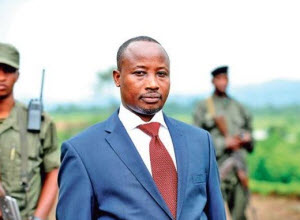Government spokesman Lambert Mende said that the Congolese government was looking forward to the response of the Rwandan government “in accordance with the agreement on judicial cooperation between the two countries, the commitments contained in item 5 of the Addis Ababa Framework Agreement and the latest recommendations from the UN Security Council.”
The former M23 rebels are accused of murder, imprisonment, torture, rape, sexual slavery, persecution on ethnic grounds, conscription and use of children less than 15 years old into their rebel group.
Jean-Marie Runiga was removed in February as the leader of the M23 political wing by current M23 commander Sultani Makenga and later fled to Rwanda. Runiga had supported Bosco Ntaganda against Makenga when infighting broke out in the rebel group, ultimately leading to Ntaganda’s escape to Kigali and transfer to the International Criminal Court.
The UN High Commissioner for Human Rights, Navi Pillay, has said about Ngaruye and Innocent Kaina, another M23 rebel commander, that “every effort must be made to hold these men, and the soldiers under their command, accountable for human rights violations committed against civilians -- both for crimes committed within the context of the current mutiny, and also for offences committed previously.”
Current M23 rebel leader Sultani Makenga was put under U.S. sanctions in November last year. The U.S. said then that “Sultani Makenga is responsible for extensive atrocities against the population in the DRC, including the recruitment of child soldiers, and campaigns of violence against civilians.”
While Rwanda has claimed for years that it does not support rebel groups in eastern Congo, it has nevertheless given refuge to several former rebel leaders accused of war crimes in Congo such as Laurent Nkunda, Jules Mutebusi, Runiga, Zimurinda, Ngaruye and others.
The UN and African Union-brokered Addis Ababa Framework Agreement, signed in February by 11 countries to tackle the conflict in eastern Congo, calls on neighboring countries to “neither harbor nor provide protection of any kind to persons accused of war crimes, crimes against humanity, acts of genocide or crimes of aggression, or persons falling under the UN sanctions regime.”
Related articles
- • DRC and Rwanda Sign Declaration of Principles for Peace in Eastern Congo (April 25, 2025)
- • European Union Sanctions Rwanda and M23 Officials over Congo Conflict (March 17, 2025)
- • Canada and Germany Impose Sanctions on Rwanda for Supporting M23 Rebels (March 4, 2025)
- • UK Suspends Financial Aid to Rwanda Over M23 Rebellion (February 25, 2025)
- • European Union Suspends Defence Consultations with Rwanda (February 24, 2025)
- • Tshisekedi Announces Government of National Unity and Calls for Unity Against M23 Rebels (February 23, 2025)
- • UN Security Council Calls on Rwanda to Stop Supporting M23 Rebels in DR Congo (February 22, 2025)
- • US Sanctions Rwanda's Minister James Kabarebe for Central Role in DR Congo Conflict (February 20, 2025)
- • Rwanda-Backed M23 Rebels Summarily Executed Children in Bukavu, UN Reports (February 19, 2025)
- • DR Congo Citizens Head to Polls to Elect President, Members of Parliament (December 20, 2023)
- • Ebola outbreak declared an international Public Health Emergency (July 17, 2019)
- • No elections in DR Congo in December without electronic voting machines: INEC (February 13, 2018)
- • DRC Seeks Arrest of Presidential Candidate Moise Katumbi (May 19, 2016)
- • Peacekeepers, Congo Army to Resume Joint Fight Against Rwandan Rebels (January 28, 2016)
- • Political tensions 'running high' in DR Congo ahead of 2016 elections (October 7, 2015)
- • UN Report Blames Ugandan Islamists for 237 Killings in DR Congo (May 14, 2015)
- • DRC Army Putting Pressure on FDLR (April 1, 2015)
- • ICC Confirms 14-Year Sentence Against Thomas Lubanga (December 1, 2014)
- • Violence in North Kivu Kills 21, Mostly Women, Children (October 18, 2014)
- • ICC confirms war crimes charges against Bosco Ntaganda (June 10, 2014)
- • ICC sentences Germain Katanga to 12 years (May 23, 2014)
- • Kerry Calls on Kabila to Honor Constitution (May 4, 2014)
- • Kerry in DR Congo for Security Talks (May 3, 2014)
- • Death toll in Lake Albert boat accident rises to 251 (March 27, 2014)
- • ICC finds Germain Katanga guilty of war crimes and crime against humanity (March 7, 2014)
- • Bosco Ntaganda Attacked Civilians on Ethnic Grounds, ICC Prosecutor Says (February 10, 2014)
- • New DR Congo amnesty law welcomed by UN envoys (February 5, 2014)
- • Colonel Mamadou Ndala Is Killed in Ambush (January 2, 2014)
- • DR Congo, M23 Rebels Sign Declarations Marking End of Kampala Peace Talks (December 12, 2013)
- • DR Congo Honors Nelson Mandela, Hero and Model for Humanity (December 6, 2013)








